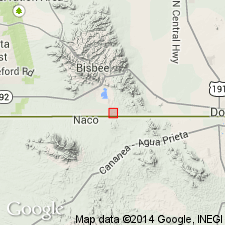
- Usage in publication:
-
- Cholla member
- Modifications:
-
- Original reference
- Biostratigraphic dating
- Dominant lithology:
-
- Sandstone
- Limestone
- Shale
- AAPG geologic province:
-
- Pedregosa basin
Summary:
Pg. 10, 16, 18 (table 2), 36 (table 6), pl. 27. Cholla member of Lowell formation of Bisbee group. Includes (descending): divisions 5a to 5l, mostly sandstone with some limestone and shale, 68 feet; and divisions 6a to 6k, mostly sandstone with some limestone, 112 feet. Total thickness 180 feet. Underlies Quajote member and overlies Saavedra member, both of Lowell formation. Fossils (division 5g yielded ammonite DUFRENOYA JUSTINAE). Age is Early Cretaceous (Aptian); DUFRENOYA DUFRENOYI standard ammonite zone.
[Occurs in the Ninety One Hills area, local name for hills in secs. 14 and 23, T. 24 S., R. 24 E., immediately north of International border in vicinity of International Monument No. 91, southeast of Bisbee Junction on Southern Pacific RR, Bisbee 15-min quadrangle, Cochise Co., southeastern AZ. Area includes type locality and standard section of Lowell Formation.]
[Misprint: compilation in US geologic names lexicon (USGS Bull. 1200, p. 788-789) covers only upper part of Cholla Member (divisions 5a to 5l). The Cholla includes divisions 5a to 5l (68 feet thick) and 6a to 6k (112 feet thick).]
Source: Publication; US geologic names lexicon (USGS Bull. 1200, p. 788-789).
For more information, please contact Nancy Stamm, Geologic Names Committee Secretary.
Asterisk (*) indicates published by U.S. Geological Survey authors.
"No current usage" (†) implies that a name has been abandoned or has fallen into disuse. Former usage and, if known, replacement name given in parentheses ( ).
Slash (/) indicates name conflicts with nomenclatural guidelines (CSN, 1933; ACSN, 1961, 1970; NACSN, 1983, 2005, 2021). May be explained within brackets ([ ]).

